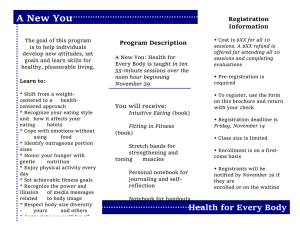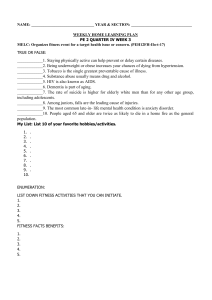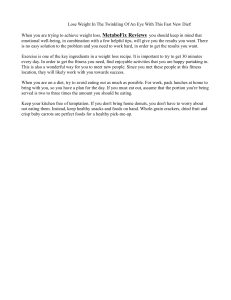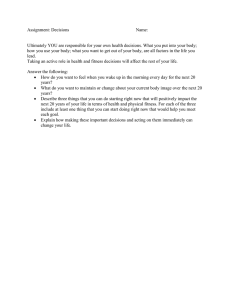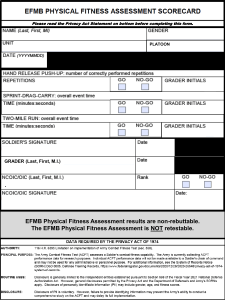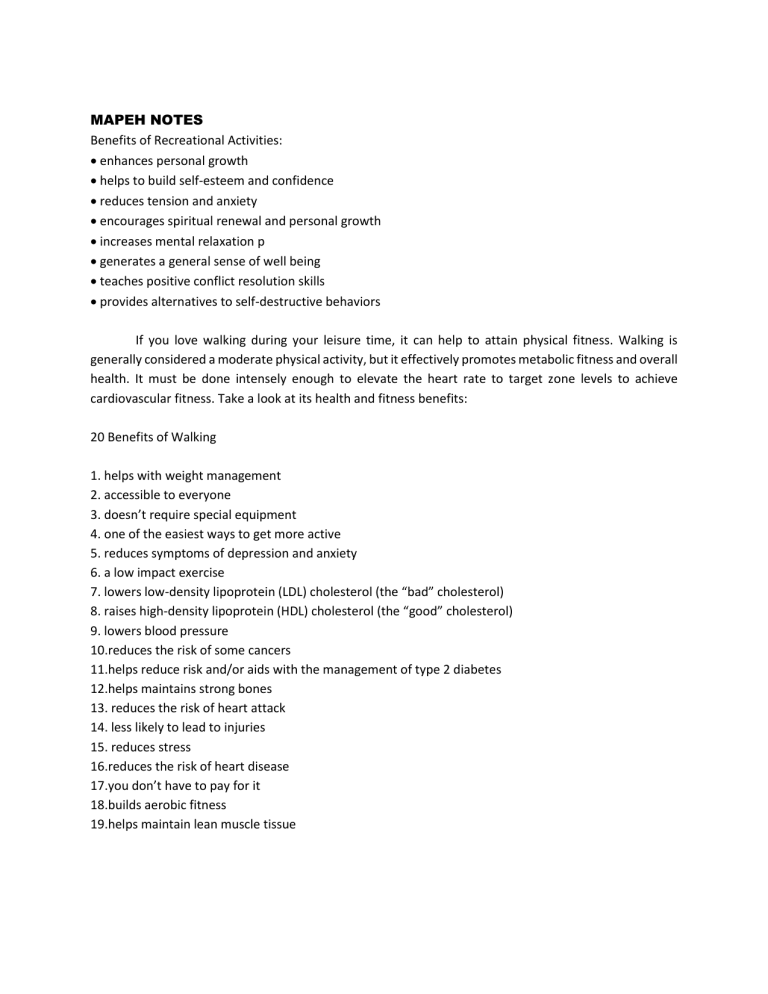
MAPEH NOTES Benefits of Recreational Activities: enhances personal growth helps to build self-esteem and confidence reduces tension and anxiety encourages spiritual renewal and personal growth increases mental relaxation p generates a general sense of well being teaches positive conflict resolution skills provides alternatives to self-destructive behaviors If you love walking during your leisure time, it can help to attain physical fitness. Walking is generally considered a moderate physical activity, but it effectively promotes metabolic fitness and overall health. It must be done intensely enough to elevate the heart rate to target zone levels to achieve cardiovascular fitness. Take a look at its health and fitness benefits: 20 Benefits of Walking 1. helps with weight management 2. accessible to everyone 3. doesn’t require special equipment 4. one of the easiest ways to get more active 5. reduces symptoms of depression and anxiety 6. a low impact exercise 7. lowers low-density lipoprotein (LDL) cholesterol (the “bad” cholesterol) 8. raises high-density lipoprotein (HDL) cholesterol (the “good” cholesterol) 9. lowers blood pressure 10.reduces the risk of some cancers 11.helps reduce risk and/or aids with the management of type 2 diabetes 12.helps maintains strong bones 13. reduces the risk of heart attack 14. less likely to lead to injuries 15. reduces stress 16.reduces the risk of heart disease 17.you don’t have to pay for it 18.builds aerobic fitness 19.helps maintain lean muscle tissue To attain fitness you also should consider your eating habit. If your BMI (Body Mass Index) classification is overweight or obese, take a look at some weight loss strategies that would help you manage your weight properly. Make a commitment to change. You must accept that you have a problem and decide that you really want to change. Incorporate exercise into the program. Choosing enjoyable activities, places, time, equipment, and friends to work out will help you get motivated. Avoid automatic eating. Many people associate certain daily activities with eating, for example cooking, watching television, or reading. Most foods consumed in these situations lack nutritional value or are high in sugar and fat. Stay busy. People tend to eat more when they sit around and do nothing. Try “junior size” instead of “super size”. People who are served larger portions eat more, whether they are hungry or not. Use smaller plates, bowls, cups, and glasses. Eat slowly and at the table only. Eating at the table encourages people to take time out to eat and deters snacking between meals. After eating, do not sit around the table but rather clean up and put away the food to avoid snacking. Cut unnecessary items from your diet. Substituting water for a daily can of soda would cut calories from your diet. Do not serve more food than you should eat. Measure food in portions and keep serving dishes away from the table. Think positive. Avoid negative thoughts about how difficult changing past behaviors might be. Instead, think of the benefits you will reap, such as feeling, looking, and functioning better, plus enjoying better health and improving the quality of life. The risk of being obese and overweight will bring a lot of health problems to many individuals. Read the health consequences accompanied by being obese. Manage your weight properly while you are still young and influence the people around you by setting good examples of how you can be fit and healthy. Health Consequences of Excessive Body Weight Being overweight or obese increases the risk for: high blood pressure type 2 diabetes congestive heart failure obstructive sleep apnea and respiratory problems poor female reproductive health (menstrual irregularities) psychological disorders (depression, eating disorders, distorted body image, discrimination, and low selfesteem) shortened life expectancy decreased quality of life gallbladder diseases stroke gout
